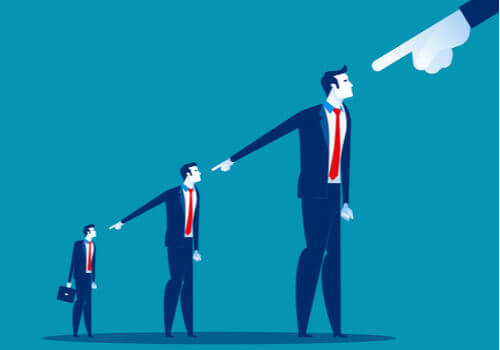Blaming others is often something children do, as their cognitive and moral development prevents them from understanding the importance of taking responsibility for their actions, so they prefer to avoid punishment when they know they have done something they shouldn’t have done. Unfortunately, many adults continue to show this type of behavior in different situations.
Blaming others first becomes a habit and then a strategy, especially in people with a high degree of narcissism or those who have no autonomy. This behavior is a stagnation in the evolution of values and emotions. Anyone who acts in this way suffers and therefore also causes pain to those around them.
- Generally.
- There is fear.
- Repressed anger.
- And sadness behind the pattern of blaming others.
- As long as these people don’t use healthier strategies in their relationships with others.
- These feelings will remain and become even more intense.
- So it’s not an effective strategy.
- On the contrary.
- It increases difficulties.
“Playing fair is not blaming others for our mistakes. “Eric Hoffer
In general, there are two main reasons why some people choose to blame others as a conflict management strategy: the first is narcissism and the second is lack of autonomy, you may think that these two aspects are unique, but they are not, in fact, very common to find them together.
It is also very common for a person to develop excessive narcissism in compensation for their feeling of inferiority. This creates a paradox. The person believes she should be loved or recognized, but is not doing what is necessary to win that love or recognition. Despite this, he’s ashamed not to be able to do it. That’s when he decides to blame others for everything he can’t.
The second reason why this strategy is used is the lack of autonomy, as with a child, there is a great dependence on authority and fear of punishment, so they punish others to avoid a bad moment, but this it increases their dependency and prevents them from developing a sense of responsibility.
The behavior of blaming others apparently has some advantage. The first is that the ego remains intact. In fact, by making a mistake and acknowledging it, you implicitly declare that it is imperfect and therefore not always fair. For a person who has no humility, it is an injury that his ego cannot tolerate.
The difficulty of accepting mistakes is not the result of over-self-esteem, but of great insecurity, some people think that making a mistake takes away their courage or questions their skills or merits, if on the contrary the person has confidence in who he is, considers his normal mistakes and a source of learning.
So there are times when the person blames others because they avoid the consequences of their actions. Therefore, you do not have to correct your mistakes. It’s a childish way to escape responsibility and guilt. Anyone who does this hides and misses the opportunity to learn from their mistakes, strengthen themselves and grow.
Those who systematically blame others for their mistakes, sufferings and disabilities hurt themselves and others, the first thing that such people can do is decrease the authenticity and openness of a relationship, in these conditions it is very difficult to build healthy bonds, and what is promoted are toxic relationships.
One of the aspects that most value life is precisely creating true intimate bonds with others, providing security, strengthening identity and nurturing courage, artificial bonds marked by manipulation only create the feeling of being alone in the face of a threatening world.
Similarly, those who refuse to assume their responsibilities also renounce their personal growth and learn from their mistakes. This stagnation ends up influencing emotions and distorting the perception of reality. Finally, it only feeds a paranoid and harmful posture.
The antidote to this tendency to blame others is humility. Contrary to what many people think, learning to take responsibility for the consequences of your actions and mistakes only strengthens and promotes your evolution as an individual.

